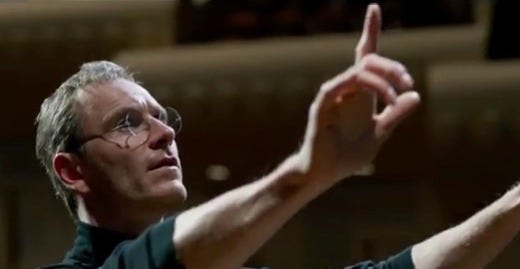Steve Jobs

Let's be clear: Although "Steve Jobs" is based on a biography by Walter Isaacson, who received the official blessing of the Apple computer pioneer, the movie is an utter fabrication from beginning to end.
Well, maybe not totally. It is about Steve Jobs. And includes conversations with several key figures in his life, spaced out over the years. And it shows the launch of actual iconic Apple products, including the original Macintosh and iPhone.
And the film depicts Jobs as both visionary and bully — qualities that everyone who dealt with him agreed he shared in equal, plentiful quantity.
But beyond that, screenwriter Aaron Sorkin and director Danny Boyle have not really tried to make a factual biopic of Jobs. Rather, they are staging a sort of Shakespearean rumination on the man and the myth. Jobs encounters the most important people in his life, nearly all of whom have turned against him, almost like Scrooge with his sundry ghosts.
The movie is not just an exaltation of Jobs the technology visionary, but also an examination of how his personal failings brought him low. "Steve Jobs" is more about the idea of the man than the flesh-and-blood one who left this mortal coil in 2011.
Michael Fassbender is commanding and slithery in the title role. Perhaps deliberately, he looks and sounds absolutely nothing like the real incarnation we know from video, usually talking about how some expensive new gadget was going to forever change our lives. Fassbender's Jobs is hyper-smart, super aggressive and views every social interaction as a contest to be won.
Kate Winslet is terrific as Barbara Hoffman, his right-hand woman and fixer. Other recurring characters are Michael Stuhlbarg as Andy Hertzfeld, an early Apple developer; Jeff Daniels as John Sculley, Apple CEO and Jobs mentor-turned-nemesis; Seth Rogen as former partner Steve Wozniak; Katherine Waterston plays his resentful ex-girlfriend.
This fictional version of Steve Jobs may or not bear much relation to the real guy. But "Steve Jobs" is a gripping tour de force portrait of an overpowering personality.
Bonus features aren't terribly extensive, but they are quite meaty.
There is a lengthy making-of documentary. And not one but two feature-length commentary tracks: one by Boyle, the other by Sorkin and editor Elliot Graham.
It's too bad that actors are so rarely included in these conversations, because it makes for some wonderful insights. Maybe that'll come in "Steve Jobs 2.0."
Film: 4.5 Yaps Extras: 4.5 Yaps



